Work and play: Five elite sports women and their non-sporting careers
- Published
Five elite sports women and their non-sporting careers
They've got world titles, Paralympic medals and play in the top-flight of their games. But these incredibly busy women also have successful careers away from sport.
Whether it's chasing lambs with a spray can on the hills of Scotland to winning world athletics medals, clocking off from one job as a lawyer then going to another as a goalkeeper in the evenings, or saving lives on night shifts in the week and scoring tries in the top flight at the weekend, these five women are living their lives to the fullest.
1. Simi Pam
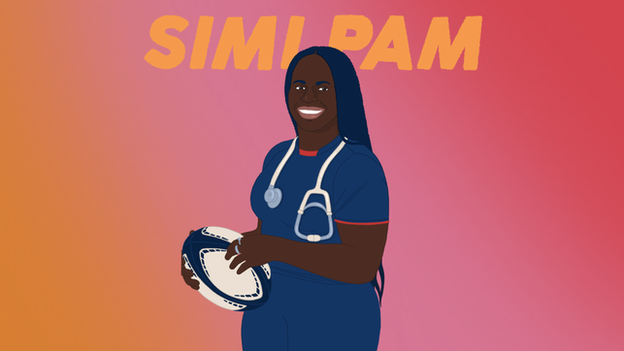
"Seeing death brings you down to earth and makes you realise that anything could happen. It reinforces my sense of self. So I want to take every opportunity and just live life."
Simi Pam didn't want to be a doctor when she was younger. In fact, seeing how hard both her parents worked in the profession initially put her off.
But now, at 26, she's working as a foundation doctor on an acute medical ward as part of the two-year programme of rotation doctors complete after graduating. She also plays for Bristol Bears in the top flight of women's rugby union.
"I knew very early on, I couldn't do an office job. I knew it would bore me senseless, I need to be on my feet. I needed something that was going to constantly stimulate and challenge me," Pam told BBC Sport.
"But I also love interacting with people and building relationships."
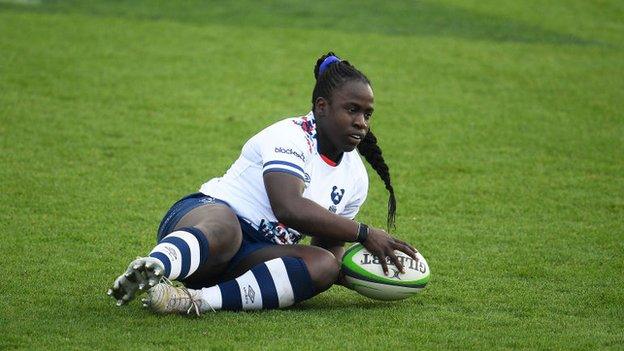
Pam, who started playing rugby while at University in Cardiff, is Bristol Bears' Forward of the Year
Pam has only played half of the Bears' matches this season because of having to work or isolate. She says it's challenging having to navigate the logistics of training, matches and night shifts. But one of the key changes she made last season - which helped her get into the Bears squad - was doing more focused, skills-based sessions.
"Me and one of the coaches would do some ball-handling or defensive stuff, key things that targeted what I thought I needed to work on. They transferred so well into matches, because they were so specific and targeted," she said.
"I didn't necessarily work harder in terms of putting more hours in, but I made the most of the time I had. That was a key lesson for me for how my life has to look. There's only 24 hours in the day and I do a job where you've got to be well rested. So it's being economical and smart about the time I do have. And the coaches are so supportive.
"The best thing about being a doctor is the ability to impact people's lives in some way. That's not always saving their life. It's sometimes helping them have a dignified death and respecting their wishes," Pam said.
"I guess it's leaving a bit of a footprint in someone's life, even if it's only something temporary like listening to them while they have a cry."
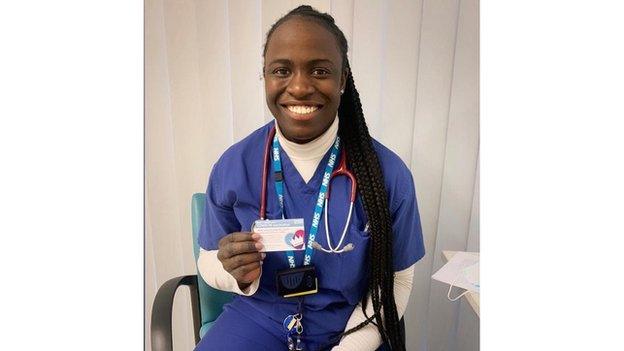
After completing her second foundation year in August, Pam plans to work less and play more rugby next season
2. Laura Muir
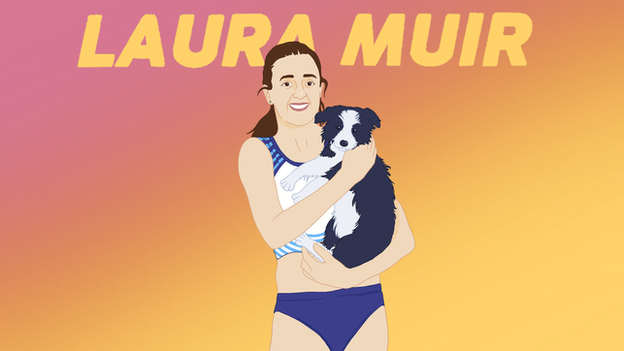
"It's funny how sometimes you think all these adversity type things can take away performance, but some can actually add to it."
Laura Muir is the fastest female British 1500m runner in history. In 2018 alone she became European champion, won two World Indoor medals and a Diamond League title. All while completing her final year of a veterinary medicine degree at the University of Glasgow.
During the 2018 indoor season while preparing for her final exams, she was en route to the World Indoor Championships in Birmingham from Glasgow, when severe weather almost prevented her getting to the venue.
"People were stressing and I was like, 'meh, if we get there, we get there!' I had so much going on, thinking about my placement and my finals. I was so stressed about the other side of it, that I went into the championship really chilled," Muir told BBC Sport.
She went on to win a silver and bronze medal at those World Championships.
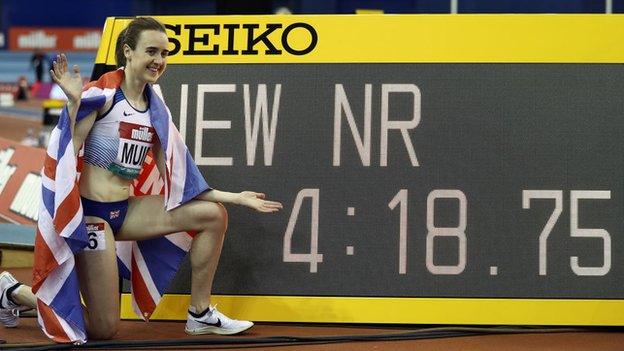
Muir holds national records for the 1500m, the mile and is the European record holder for the 3,000m
"It was really hard juggling the two. You're on your feet all day, maybe out on farms early in the morning too. But at the same time, it was nice to have something to distract me from each one. Having that kind of stress relief was great."
Allow Instagram content?
This article contains content provided by Instagram. We ask for your permission before anything is loaded, as they may be using cookies and other technologies. You may want to read Meta’s Instagram cookie policy, external and privacy policy, external before accepting. To view this content choose ‘accept and continue’.
Muir, who has five European titles, studied from 2011-2018. Her university allowed her to complete her degree in seven years instead of the usual five and, she says, always supported her athletics career.
As part of the course, she completed a range of practical placements alongside lectures, working on dairy farms, in kennels, catteries, a birds of prey centre, Dogs' Trust and at the RSPCA. And she found some surprising transferable skills between running and vet training.
"I was doing some lambing with a farmer on a hill-farm. The sheep were out on the hills and we had to catch the lambs to spray them and match the ewe to the lamb.
"We had a good little system where [the farmer] would be driving the quad bike and I'd be on the back. I'd jump off and manage to catch the lambs because I was quick. Running came in handy sometimes being quick off the mark, catching sheep and stuff!"
Muir, who says she grew more wary of being kicked by horses and cows the more high-profile she became as an athlete, is also the designated spider-catcher on GB camps.
"If anybody's having a freak-out moment, I'm the one who gets rid of the beastie as we say in Scotland," she laughed.
Muir is focusing on her athletics career full time at the moment but has recently worked on campaigns for animal charities and says although she's known since she was 11 years old that she wanted to become a vet, she's keeping her options open.
"Veterinary isn't just to be a vet - you can do so many different things with it. It's such a versatile course," she said.
"I think not having a back-up would be quite nerve-wracking. The sport is so unpredictable. But having my degree takes an awful lot of pressure off."
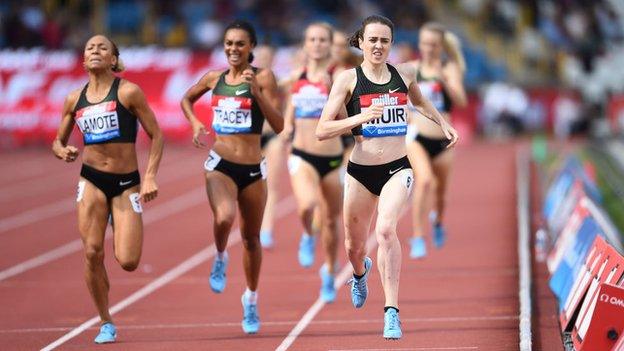
Muir was the 1500m Diamond League title winner in 2016 and 2018
3. Sophie Christiansen
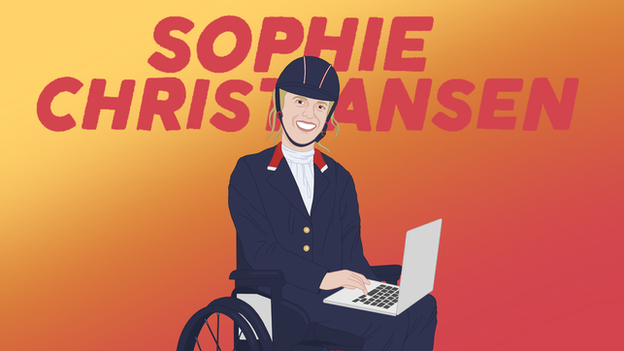
"I went to my first Paralympics just after my GCSEs. So I learned to balance my education and sport from a young age."
Sophie Christiansen has eight Paralympic gold medals in dressage and is also a software developer at Goldman Sachs.
Christiansen says software development is "getting the data for a service or designing a website - basically writing programmes and coding".
"In this world where technology is everywhere, being a software developer is a really exciting job because the possibilities are endless and it'll never get stale," she told BBC Sport.
"I think that's my personality. I always want to get better and do more. So knowing that I'll never learn everything is quite cool."
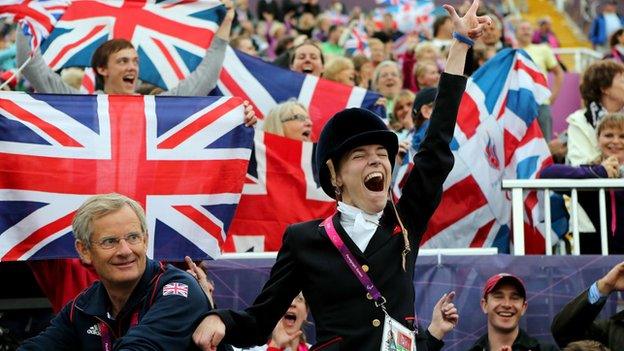
Christiansen won three gold medals at London, three at Rio and two at Beijing
Christiansen was born two months prematurely with cerebral palsy and survived despite suffering jaundice, blood poisoning, a heart attack and a collapsed lung. She began riding aged six on a school trip as a form of physiotherapy, loved the freedom horses gave her, and took up dressage when she was 13.
Software development was something she says she fell into.
"But I did do a course on mathematical computation at university and got my highest marks in that. So it did make sense!"
Currently she works two days a week and says the flexibility of software development work is great for disabled people, because you can easily work from home, which makes it easier to work around elite sport too.
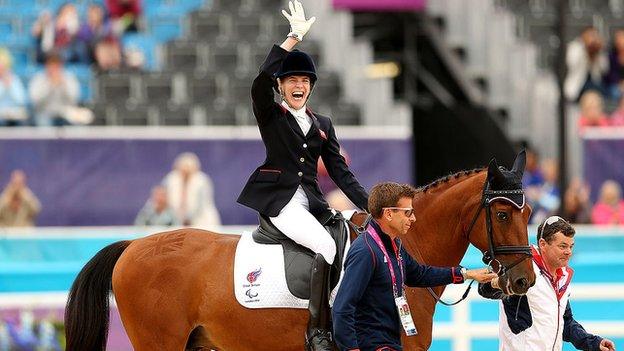
Christiansen two gold medals and a silver at the 2008 Paralympics whilst studying for a master's degree in maths at Royal Holloway, University of London
But she still has to take annual and unpaid leave in order to compete for GB.
"That means I never have a holiday which is quite difficult sometimes. For the last Paralympic year I had to take unpaid leave because I needed more time off than was possible and that might happen with Tokyo as well.
"If I was able-bodied, I could make a living out of being an equestrian because able bodied-riders get far more prize money than we do. I'm in the most disabled category, which means that I need to pay a whole team to help me with my horses because I can't do it myself. I honestly don't know what I'd do if we didn't have National Lottery funding because I just couldn't afford it.
"The reality is the world is not a friendly place if you've got a disability. The Paralympics makes it a level playing field but that's not the case in the real world. So I'm very much an advocate for having work experience alongside your sport."
Christiansen, who is a four-time Paralympian, has worked at Goldman Sachs since 2014 and says juggling elite sport and work is tough, but she lets her managers know when she's struggling.
"I think as women, that's almost our strength - to be able to talk about who we are and not be afraid that we need to be perfect."
4. Janice Monakana
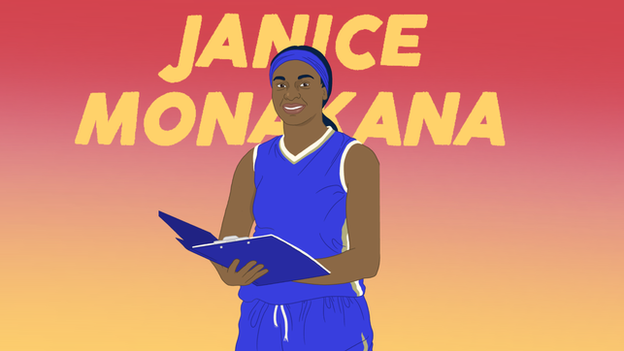
"I bring my teamwork experience from sport to work, especially during the pandemic when it was so hectic. But everyone cares about the next person. It's more of a family."
Janice Monakana is a Great Britain, England and Sevenoaks Suns basketball player and also a NHS recruitment coordinator.
Monakana manages recruitment in two hospitals for the women's and children's departments including maternity and neonatal units, plus sexual health clinics.
She works Monday to Friday as part of a team who recruits everything in those departments, from administration roles to nurses and consultants. On top of that, she trains with the Sevenoaks Suns three times a week and plays games on weekends.
"I think it's quite fulfilling in the sense that you are helping people," she told BBC Sport.
"Especially during the pandemic when jobs are a blessing. So it's a nice feeling when you finish someone's checks, and they're super grateful that you've been helpful and made that process smooth for them."
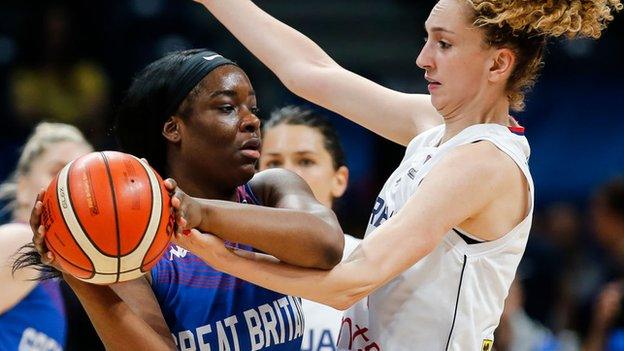
Monakana has played basketball for Great Britain and England since she was 14
It was Monakana's dad who got her into basketball when she was 11 years old. He died three years later. Monakana, who has five siblings, works two jobs to financially support her family.
"For me, [working alongside basketball] wasn't really a choice. I'm supporting more than one person so I have to work more than one job. And I didn't want to give up basketball."
Monakana says going to the University of Toledo, Ohio, on a sport scholarship at 18 helped her learn how to manage her time. And she says, it's even harder than it looks in films like Coach Carter.
"It was very intense. We practised six times a week for three to four hours and also did weightlifting. You have to do 10-15 hours' study table per week too, so you clock into a workspace just for athletes," she said.
And like in Coach Carter, Monakana, who studied business, had to maintain a certain grade point average (GPA) to be eligible to play.
"When I first went there it was a big shock. But it's helped me a lot in being able to manage my time effectively, prioritise things and not being overwhelmed. It would have been difficult for me right now if I didn't have that experience," she added.
When she returned to London, Monakana started playing for Nottingham Wildcats and enrolled onto a masters degree in HR management.
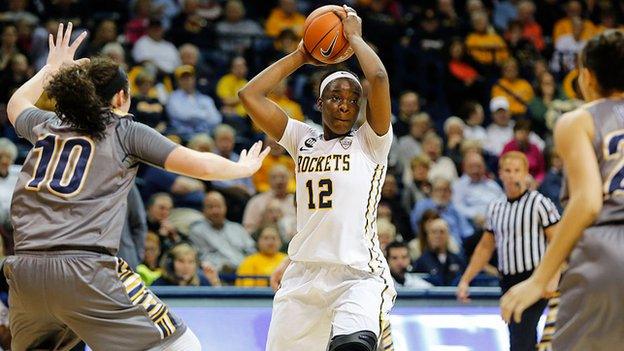
Monakana went on a sport scholarship to the University of Toledo, Ohio
Monakana says the best thing about working alongside playing basketball is having a "security blanket".
"It's a relief to know that when I do want to retire, it wouldn't be as hard for me to get back into the working world because I've had experience," she said.
Monakana takes annual leave in order to attend national basketball camps which means she rarely has time off for a break.
But she says her managers at the NHS are "more of a family" in the way they support her.
5. Chloe Morgan
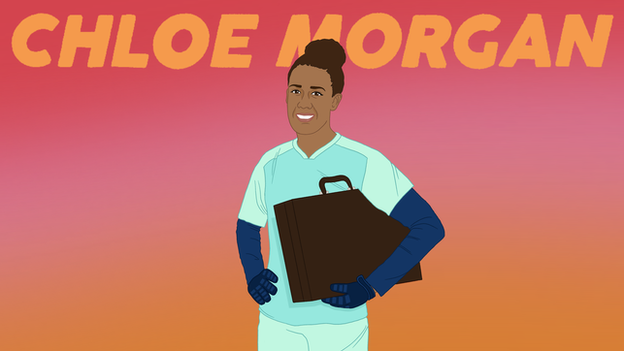
"You've got to be resilient in both football and law. Especially as a goalkeeper."
Crystal Palace goalkeeper Chloe Morgan knew as a teenager that she wanted to be a lawyer. She never thought she'd become a professional footballer - let alone do both at the same time.
"This is so cheesy, but it all started from watching the film Erin Brockovich with Julia Roberts, seeing her take on this big corporation and help loads of people," she told BBC Sport.
"Getting that education and that qualification was my biggest focus growing up."
After studying law at the University of Leeds and spending a year getting her solicitor qualification, she got a training contract at a firm in Essex. Then she joined Irwin Mitchell as a civil litigation lawyer four years ago.
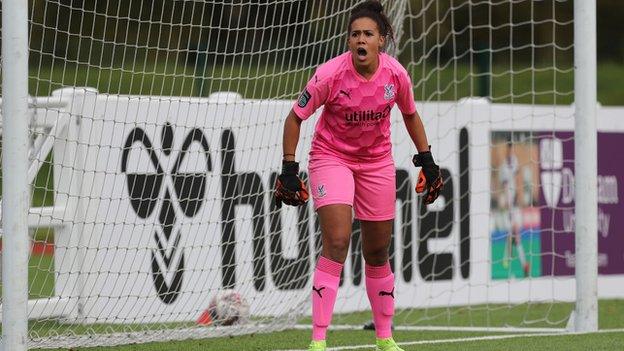
Morgan joined Palace Women at the start of the 2020/21 season
"I work in personal injury, which I absolutely love because you get that face-to-face contact with clients and you feel like you're helping a person rather than maybe a business or an organisation.
"My days are quite structured because we have a lot of cases and they've all got deadlines and you have to keep a tight track of what's going on."
Morgan works 9-5 and then trains from 8-10pm in the evenings with Palace and plays games at the weekend.
"I love having the balance of both work and football. You have something completely different to look forward to and it's a big distraction from the stresses of the day."
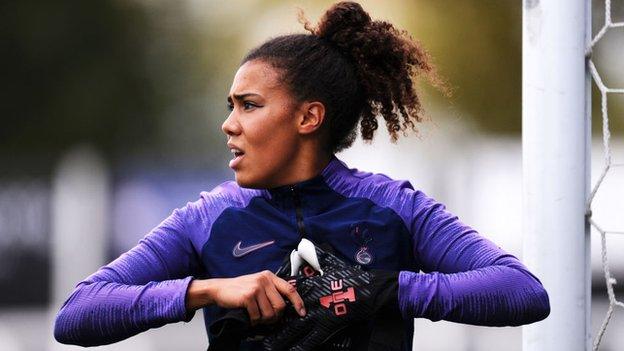
Morgan played for Spurs from 2015-2020
"Law is such a competitive industry and I didn't know anyone in it, I didn't have any contacts in the industry," Morgan said, explaining that she had to do hundreds of work experience applications at school.
"It's frustrating and disappointing, because you get rejected so many times and you've got to be resilient. Which you have to be in football too.
"Mistakes happen, problems arise. And you need to be able to problem-solve and strategise if something's not working. I think both environments can be quite intense when you need to achieve results.
"It's nice to take a bit of a step back and go into something completely different and realise there is a bigger picture - that things are going on outside of law and football. It allows you to reflect and appreciate that there's more to life!"